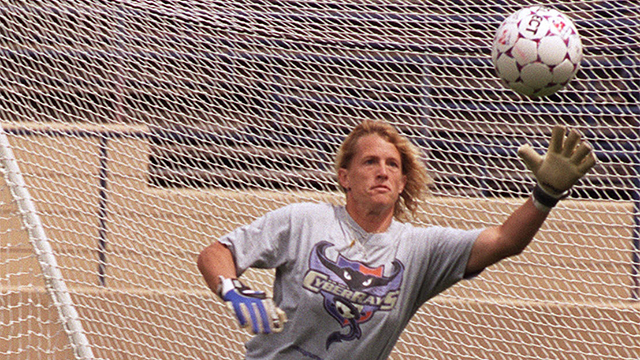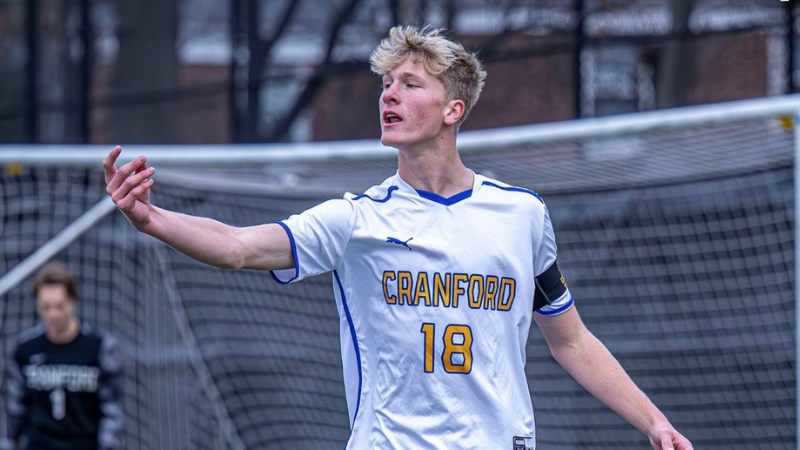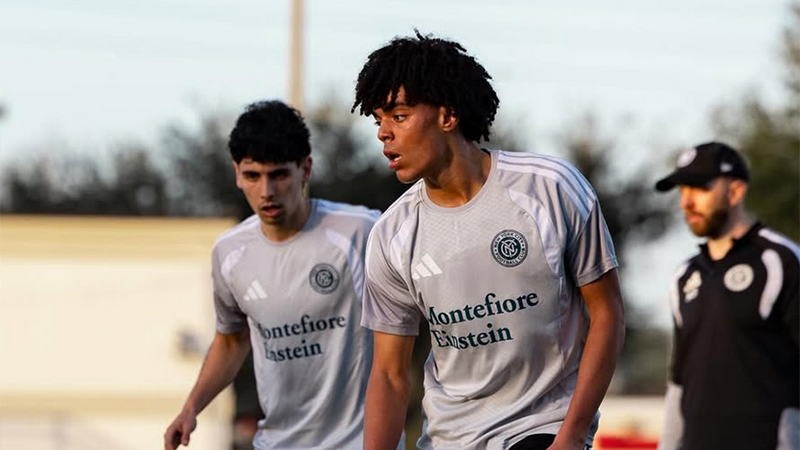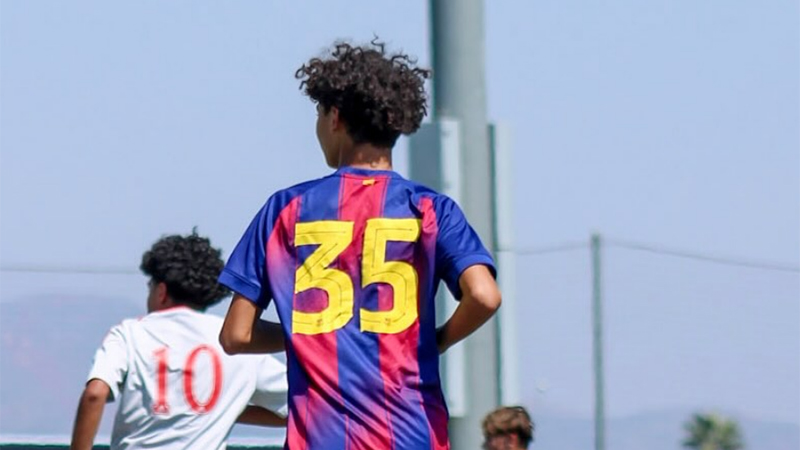Q&A: Former college star Janine Szpara

Janine Szpara is a former collegiate standout goalkeeper and proud alum of the US Women’s National Team. Starting her freshman year at Colorado College in 1985, Szpara quickly established herself as the top goalkeeper in the country. During her four years at Colorado College, Szpara earned four first-team All-American awards, a feat no goalkeeper has matched to date.
From 1986-87, Szpara earned six caps with the USWNT while the program was still in its infancy. Although her time with the national team was highlighted by a historic trip to China, Szpara’s career faced an uphill battle with a lack of a domestic league and poor support from the federation.
Bill Reno talked with Szpara about her journey to become the greatest collegiate goalkeeper of all-time, forgotten aspects of the USWNT’s early years, and frustration of how the USSF handled the women’s program.
BR: I think people would assume a four-time first-team All-American goalkeeper was just a monster in net from day one but I’m guessing you didn’t feel like that as a freshman. So what was that journey like, coming in as a freshman then becoming the best in the college game?
JS: I got to school and there were two freshmen goalkeepers and that’s fair game, you know? Either one of us could have started. So I didn’t really think of it that way. I think making the youth national “paper” team gave me some confidence so I thought “Well I’m up there” but, especially as a young woman, we don’t think that way most of the time. We don’t think “I’m the best ever in the world.”
When I was being recruited by Santa Barbara and they had Moncia Hall. She was at UC Santa Barbara and she was an All-American at this time and she was going to be either a junior or senior. The coach called me and was like, “Well you know, obviously you’re not going to play for a year or two because Monica is here and she’s an All-American” and I just remember going, “Well, you're not even going to let me try?” *laughs* “I don’t even have a chance to compete with her? That doesn’t seem like a very smart move for me.”
So I remember thinking that way. “Well, I don’t think I’m better than her but I don’t know. I’ve never played against her. Yeah, she has an award but if you’re not going to let me compete why in the world would I go to your school?”
BR: Your freshman and sophomore year, you lost out to UNC in the semifinal and final, respectively. But your last two years, Colorado College lost in overtime in your first games of the national tournament, despite entering the tournament with an imposing record. What was the difference between those years?
JS: On paper, we had more talent the last two years. Looking at it now, I just know what I felt, I did not enjoy it. I did not have a good experience my senior year. And that was part of it. I know the team was not cohesive and that was frustrating. I was just trying to do my best and wondering, “Why are teammates working against each other?”
I played for the San Jose CyberRays in the WUSA and the first year we won the whole thing. And that’s the best team cohesion I’ve ever seen. Those women all worked for each other. It’s not that we all hung out together. People hung out in different groups. But we all got along and cared about each other and it was great. And that's why we won. We were good, and I’m not down-paying anyone on the roster, but they got better and better the next couple years and they came in 7th the next two years. But that was another illustration to me, and now that I’m looking back on it, that was a huge thing. The cohesion was the magic. When you are divided, and it started at the top, got manufactured, things weren’t solved and CC was not as successful.
BR: That’s really interesting to hear because I feel like the dynamics of a men’s and women’s locker room are typically different. On the men’s side, so many players are delusional they’re going pro while on the women’s side, so many are retiring early. It’s like there are two completely different approaches to the game.
JS: Women were not in it for the money, and that’s a really basic way of saying it. Really, it’s the lack of money in our sights. We don’t have that picture. Some younger people do now, to some extent. Some girls want to go professional but that’s in the last, what, 5-10 years? We didn’t grow up that way. We were just doing what we liked with our friends.
April Heinrichs, I think, was the first women’s player that went overseas and played in Italy. But that wasn’t an option for most of us. Dreaming is a lot harder when there’s absolutely no picture of it. It’s just a different view as a girl where you’re standing and looking around. I ask all the time, “Who are your female heroes? Who are you looking up to?” and even now some girls can’t name them.
BR: You mentioned having a lack of a picture but I think that extends to coaching as well. I think it’s slowly changing but it’s still very common to see an all-girls club being coached by only men or a collegiate team have a staff of four male coaches.
JS: I think it also goes back to what you see growing up. I mean, if there’s just one woman on staff, even becoming a coach doesn’t really look like a viable option for a young girl when you’re surrounded by male coaches all the time. You see all this but what you don’t see affects you just as much as what you do see.
BR: You played your first match with the national team before your sophomore season in college, which is unheard of in today’s time. What stands out about your time with the national team?
JS: My first year, there was a tournament in Italy we went to and we had like four games. The second year, we went to China. That was huge. We played a game and we joked that they shut down the town for it. I thought, at the time “Wow there's all this traffic going to this place.” The stadium was through this small town and at the foot of these hills. So it was just a real choke point and the street was packed. We got to the game and the stadium was full. There were 70,000 people in that stadium. There were people sitting in the trees, outside above the stadium, watching the game.
Later that night, we went into our hotel rooms and someone was like “Turn on the TV!” and I said “Why? It’s all in Chinese.” But we turned on the TV and realized they were broadcasting the game, which was a first for us. Someone said “Wow, they broadcast the game” and I said, “Yeah, for all three people who weren't at the game.”
It was all so interesting. We joked we had the secret police with us because we had these people with us when we went out even on walks. That was one one of the most surprising things we experienced. We also saw the police or security guards beat up a fan after a game. This man threw a corn cob at us, from far away and it did not come close to us. They caught him and hit him a few times. That’s what we could see as our bus pulled away.
I know that first year we got $5 dollars a day per diem. And we were of course excited. And then a couple years later we found out the guys were getting $50 a day per diem. And that wasn’t for food. Our food was paid for. Somehow we were worth a tenth of the men. I know it seems small, but it speaks volumes about what they’re really like and they're still a company doing what they have to for one side, but only really caring for the men. It’s like “Yeah, whatever we need to do to shut the women up, then fine.” Stuff like that always felt a little unprofessional. Are you the men’s federation or are you the soccer federation? Are you about the whole game of soccer or just men’s soccer?
BR: There’s always a lot of positive talk when it comes to remembering past players or wins in the USWNT’s history, but I’ve always found it interesting how the 1991 World Cup seems to get brushed over. What would you say is forgotten about the early years of the USWNT?
JS: I think of the beginning years of the national team and what that looks like and I’m thinking “Why do I think that’s important?” And to me, it’s because in this present fight with the USSF about pay. US Soccer is bringing in all these arguments and they’re not consistent. It’s not the full story. US Soccer has a pattern of not supporting and giving the women what they need or what they deserve.
But things came along slower. It was 1984 when they had the first women’s national team. One training camp and one trip a year for the first couple of years. The early years saw the women going to practice on a rented city bus and playing at a city park. Later we stayed in dorms and practiced at small colleges.
They had the first men's team before 1950. If you look at the history of when they added teams, things like how many youth boys teams did they have, how many youth girls teams did they have, and how long it took them to do that, full-time coaches, a technical director. There’s just a lot of that lack of support underneath it. They told us to be grateful we had a team but it was like “Do you want the team to be good?” Are you structuring US soccer or US men’s soccer?
Right at the end of the summer in 91, I was at the women’s national club championship and our team was playing in the final four for the championship. They had a dinner one night in the ballroom and all the teams were there. Hank Steinbrecher was there and he got up and he started to talk for 40 minutes or so, all about the men’s World Cup that had been awarded to the US and was coming in 94. He had at least six, seven, or eight US Women’s National Team players who were about to leave in a matter of weeks to go to the first Women's World Championship (because they didn’t call it the World Cup). We’re about to go and he doesn’t mention the women at all. I’m sitting there with Amy Allman, Karen Jennings, and, I think, Brandi [Chastain] was on that team. We had like four or so national team players on our team. Finally, I just say “Hey what about the women?” out loud and Steinbrecher goes, “Oh, oh, yeah… Well, the women are going to do great. We’re already building them trophy cases. We already know they’re going to do great and they’re going to win.” And that was it, after someone shouts out at a dinner. *laughs* But there was no sign of caring that I ever saw.
After the women won, the USSF president went and congratulated the players and he didn’t know some names of the players. He called them by the wrong names! *laughs* Everybody thinks “Oh, everything started in 99 and it’s all been great” and that’s what US Soccer says, “It’s all been great.” Well, US Soccer has done as little as they possibly can for the past 20 years. It feels like even with success there hasn’t been an embracing of that success. There seems like there’s a reluctance to acknowledge what the women have done for the game.
BR: I’ve always found it interesting how colleges have similar attendance records for the men’s and women’s soccer programs. It seems that if you have a similar investment on the front end for both the men and women, the fans will reciprocate it as well.
JS: One of the metrics I’ve seen is based on viewers and how much you can charge for commercials. For a couple of years, the women have outshone the men, but they undercharged for broadcast rights for the women, when their own metrics say they could have charged more. And it feels like that’s what they do in general is undercharge and undervalue the women monetarily and commercially.
It just comes back to them wanting to win the men’s World Cup and I just want to turn around and say “Well you’re never going to win it.” *laughs* I know, that’s harsh, but it just comes down to that. The women’s World Cup isn’t the men’s, so it’s not that important to them. It continually seems to me that [the USSF] just puts in what they have to. Whatever they say is completely something else from what they’re doing.
BR: I’ll laugh at some of the excuses I hear about why the women's game shouldn’t be as supported. Some people will complain that the women’s game is too slow but you can fast forward the men’s game if that’s how you get your maximum entertainment. Just watch it at a faster speed and it’ll be “better” if that’s really your complaint.
JS: There are a lot of excuses and reasons you can find in any topic on why someone doesn't want to do something. “Women aren't interested in sports so we’re not going to put it in colleges. They’re not that into it so they don't need this or that…” And to your point about parity, it affects what you get out of it. So you’re not putting any money into the sport so you’re not going to get anything out of it. Great business model. *laughs*
The hard time I have with people who say “Oh it’s not as good and this and that” is what you say. So what type of soccer do you like? Run fast, kick hard, just run down the field and kick the shit out of it? That’s not great soccer. And then there are people who don’t even watch the game but they’re like “women aren't as good.” Well how do you know? There’s a ton of that and it’s hard because you’re trying to battle so many excuses for things, which is why Title IX is great. We didn’t have to ask as much. UNC is a great example. Talk about throwing money at something and being successful. “You have scholarships and no one else has scholarships?” I mean, that dynasty lasted for, what, twenty years? How many championships do they have?
BR: I think it’s more than twenty. I’d have to look it up.
JS: That’s ok, North Carolina, big rivals you know, but that goes back to playing against them. *laughs* But if you’re ten to fifteen years ahead of everyone financially, and you're getting all the best players, what player is going to want to go to another school? Clive Charles once said “I’m looking down the bench and Carolina is substituting players that are better than my starters. I’m playing against the number one and number two team in the country today.” How do you compete with that?
BR: You talked about the lack of support and resources earlier. How did that impact you and the team on the field?
JS: At Colorado College we were very well supported. My freshman year was the first year CC went DI with their women’s soccer team. The school came into compliance with Title IX as our school had a DI men’s Hockey team. Scholarships, travel and gear was good. Okay, maybe I didn’t like the one 16 hour drive to St. Louis in vans but I always enjoy a good story so we had that going for us.
The first few years of the national team, there was not a goalkeeper coach. Then there was a goalkeeper coach, not [former USWNT goalkeeper coach] Graeme [Abel]. Graeme’s good, I respect Graeme, but there was another coach along the way that was just there so he could get a men’s job. He didn’t care about it. He coached women like he coaches men, which 99% of it is he just cracks balls at them. So you look at, what do you want, what are you getting? What are you asking for, what are you doing? So if you’ve got a bunch of yahoos who are looking to be a personal trainer and just crack balls at them, it’s like, “This is a great idea.” *laughs* It’s just stunted.
I looked up your article about US Soccer not having a goalkeeper director and thought about it, which I whole-heartedly agree with, but this comes down to US Soccer, where a couple years ago where they said they instituted something where you had to be 5’9” to play in goal. So the critical thinking from the top is that they’re going to solve goalkeeping by a height requirement. So that’s a lot to digest on who’s leading what in our country.
BR: It is odd to see a country leave such an easily filled position vacant for so long, especially considering how many eligible coaches there are.
JS: S*** man, yeah, I would apply for that job. Let’s make it happen.
BR: Would you say the biggest difference between the national teams in the 80s and more modern teams was the investment?
JS: Yeah definitely. [The 99ers] were higher profile so people were kind of looking and asking. But the federation thought, “The women are already successful so why do we need to invest more money into them? Well let’s spend a couple of million dollars for Project 2010 to train the boys” and they had started the academy. They spent so much money on the academy. Okay, so that’s good for the boys but it’s only good for boys? Those kinds of decisions are a pretty good indicator of what was missing.
BR: You earned all your caps with the national team before you turned 21. It seems like you were almost a little too early on the scene, with a lack of a professional league and national team stability. Looking back, do you have any regrets or wish things would have gone differently for yourself?
JS: No, because I don’t think that way. I was making myself laugh because of your list [of the greatest collegiate goalkeepers]. I was like “Oh yeah, number one! I peaked too early didn’t I?” *laughs*
I really don’t have any regrets. I believe my life went the way it was supposed to. I value all the experiences I had where I tell these stories like, “I picked up the equipment and took it to camp”. And I saw what they did with our national team gear that they gave away to the boys’ teams and then did not give us any. I saw a lot of things and I was super lucky. I did well and was successful before, during, and slightly after college. I had this totally unconventional path. I had some of my friends that I played with but weren’t in the WUSA. They were like “Oh my god you’re representing all us old gals.” Because the second year I was the oldest woman in the WUSA. It was a really amazing and lucky thing to get to see. It was what it was and it was great.
No, I don’t have any regrets. I just feel really grateful for what I got to do and experience. Play overseas and learn a little bit of a language and meet great people and have your mind open and all the travel I got to do through soccer before that too is really wonderful. I want these women now to keep pressing ahead is the only thing. Don’t sit down and say “Thank you very much.” Keep pressing ahead. That’s what I want, because it’s my job or something. My mission. *laughs*
Headlines
- Recruiting Roundup: February 2-8
- Professional Signing Tracker: 2025-26
- Tracking Division I Coaching Changes
- 2026 Women's Division I Transfer Tracker
-
Best U17 Boys Outside of ECNL + MLS Next

- U15 BNT Roster for Camp in Cyprus
- Unsigned MLS Academy Players in Preseason
-
Best U16 Boys Outside of ECNL + MLS Next

-
Club Soccer Standouts: January 31-Feb. 1

-
Commitments: The Pull of the Pride




